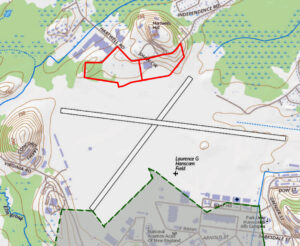
The Hanscom Field expansion area is outlined in red. Lincoln’s approximate town border is indicated by the green dashed line.
Local officials and organizations are quickly rallying to fight a proposal that would add about 408,000 square feet of new hangar space and reconfigure a taxiway to accommodate larger aircraft at Hanscom Field.
At a February 6 public forum, the possibility of a “fuel farm” was also mentioned, according to the Bedford Citizen. The online meeting, which drew dozens of residents from area towns hosted by the office of the Massachusetts Environmental Policy Act (MEPA), took place just eight days before the public comment period closes.
The Lincoln Select Board held a special meeting on February 10 to discuss a letter in opposition to the project. Mothers Out Front and the Hanscom Field Advisory Committee (HFAC) have also written letters against the idea, and other Lincoln groups such as the Green Energy Committee and the Planning Board are also expected to weigh in.
State Sen. Mike Barrett, a key climate activist in the state legislature whose district includes the four Hanscom towns, also spoke out at the MEPA forum, the Bedford Citizen article said. “It is striking that in the middle of our attempt as a state to deal with an existential crisis, Massport is intent on building its private jet business,” he said.
“There is a climate change emergency and every effort must be made to phase out and not expand use of fossil fuels,” the HFAC noted in a letter to MEPA.
Mothers Out Front claimed that paving and construction will lead to more stormwater runoff, fewer carbon-storing plants, and stress to wildlife, wrote. “We believe [the proposal] represents an example of profits over people,” they wrote.
The project’s proponents say that additional hangar space will reduce the need for “ferry flights” to and from full Hanscom hangars to other storage areas, but the idea that “adding 90 football fields worth of space would reduce emissions from aircraft struck me as hard to believe,” said Select Board member Jim Hutchinson at Friday’s meeting.
The draft letter, which will go out early this week, listed 10 specific requests and areas of concern about the project. It asked for more information on current and projected traffic of both aircraft and ground vehicles at Hanscom Field, data on ferry flight frequency, destinations, and emissions; the flight paths, maximum size, and noise profiles of aircraft that an expanded airfield could accommodate; and details on the fuel farm, including the amount of fuel to be stored, the size and number of vehicles that would transport it, and how potential fuel spills will be handled.
The pandemic put a dent in many businesses, but jet operations at Hanscom are actually up by 19% since 2019, Massport noted at an October 20, 2022 meeting (total operations are down by 6% as recreational and pilot training operations continue to decline).
In one sign of the strength of the private jet business at Hanscom, Magellan Jets recently opened a dedicated passenger area in one of the airfield’s buildings. Business travel dropped during Covid-19 but private flights for leisure travel mostly made up for it; the pandemic “really opened everyone’s eyes to what’s available domestically” for private travel, said Anthony Tivnan, president of Magellan, whose fees start at $6,900 per hour for use of one of its eight-passenger planes.
“This is not about military flights that are defending our country, or commercial aviation — this is about private jets getting people to where they want to go,” Select Board member Jennifer Glass said.
“I feel like bigger things were planned that was being addressed at that listening session,” resident Miriam Stason said at the elect board meeting. Hutchinson agreed, saying, “Massport doesn’t usually make these plans without a bigger picture in mind.”
Another worry: larger and more frequent flights may involve planes taking off and landing at Hanscom at night. The fine for doing so is just $400, and it’s not legally possible to increase that amount.
Officials also noted that Hanscom expansion will most directly affect the environmental justice community in north Lincoln, which includes the Battle Road Farm development, where 48 of 120 units are designated as affordable housing.
Massport tried to expand Hanscom back in the mid-2000s, but cooperation among the four towns helped defeat that effort, said Sara Mattes, who was a Board of Selectmen member at the time. “We have to look at what worked and what didn’t work” from that time, she said. “This is just round one of a long trench warfare.”
Leave a Reply